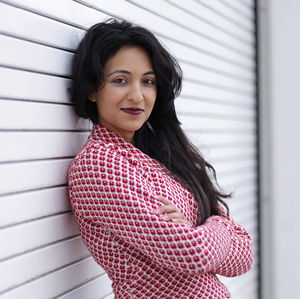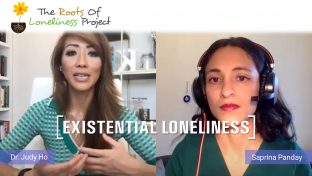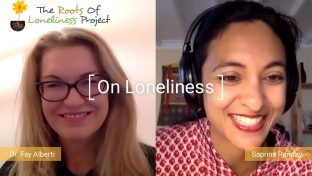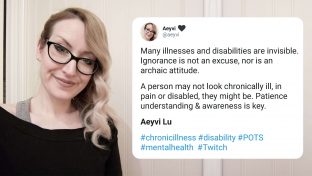Cancer Loneliness: Sue’s Journey & Triumph Over Breast Cancer
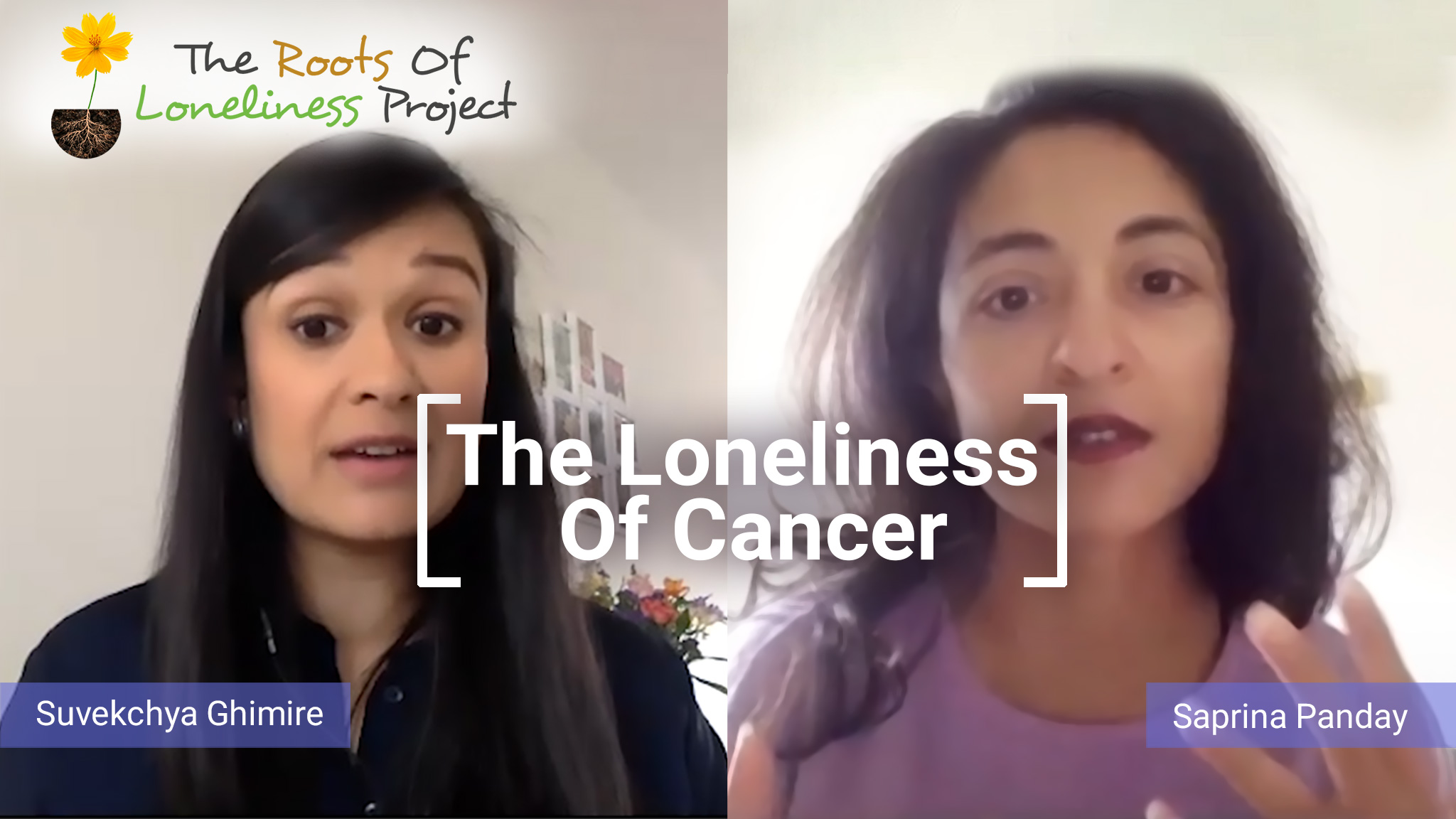
- Women tend to experience a deep sense of loneliness after cancer treatment as the disease no longer calls for immediate attention or attention.
- Both the mind and the body have the capacity and the resilience to face treatments such as chemotherapy, to heal, and to navigate different states throughout the cancer journey.
Struggling with loneliness or having a mental health crisis?
- Suicide Prevention Lifeline: 1-800-273-TALK (8255); Deaf or hard of hearing dial 711 before the number or connect via online chat
Let’s be honest: most of us feel lonely at one time or another throughout our lives — for many different reasons.
Like you, I’ve been curious about my loneliness.
Is it normal? Are there others that feel this way? Should I be embarrassed to feel lonely when from the outside, my life seems great?
To learn more about loneliness in all its forms, I’ll speak with experts on our show, “On Loneliness: A Video Series About Coping With Feeling Lonely,” created by The Roots Of Loneliness Project, a first of its kind resource that deeply explores over 100 types of loneliness to help you gain powerful insights and feel less alone.
The Loneliness Of Facing A Cancer Diagnosis And Treatment
Sue Intro: As a family — cousins, and so on — and relatives as well, I was the first one with cancer. So, for everybody, it was a shock.
That made me feel lonely, as well, because there was nobody else who had gone through the same experience, [nor had I] known about cancer in such detail.
In my book, I talk about my experience with surgery, with chemotherapy, and its long list of side effects.
Saprina Intro: Welcome, everybody. My name is Saprina and I’m very excited today to [introduce] a dear friend of mine, Suvekchya Ghimire, who is an incredible young woman and a survivor of breast cancer.
Thank you so much, Sue, for being part of our journey today.
Sue: Oh no, it’s a pleasure.
Saprina: So, I’m just going to give a little bit of background about you so that people know: in 2016, you got diagnosed with breast cancer.
At first, you discovered this yourself; you were just in the shower and you had a gut feeling that something was off.
And then you went to see a doctor, you got tests done, and then you went to treatment. You got a mastectomy of your right breast that was followed by chemotherapy and radiotherapy.
And now, you are recounting your journey in your latest book, which is called Cancer, Curry and Me, releasing in 2020.
[Editor’s note: Sue’s book was released in October 2020 and is available at Amazon.]
I would like to talk a bit about your journey with cancer, but specifically, the loneliness that you encountered.
I think for so many people, there’s so much information about cancer but then the loneliness aspect of it is usually very private.
So, could you tell us what you discovered about that in this journey?
Sue: First of all, thank you so much for having me here. And it’s really great to be sharing my experience.
As you rightfully mentioned, in 2016, I was diagnosed with cancer.
And talking about loneliness during cancer — I’m sure everybody has a different experience — but for me, I felt that I experienced [loneliness] at different stages, at various stages throughout the process of finding out about cancer, during the treatment, and afterward.
I think it was more when I found out that I had cancer. Which, of course, is a shock, but also the whole idea or fear that “cancer equals dying” was a part of me, as well, before the final test results were given to me.
But the constant “Will I die or not” makes you feel that you’re in this alone, because nobody [else] can experience that feeling — not even your very supportive family and your partner.
Another [aspect of loneliness] was also the fact that I was the first one in my family to be diagnosed with cancer — not just breast cancer, but just any kind of cancer.
Luckily, knock on wood, I have a very healthy family background.
As a family — cousins, and so on — and relatives as well, I was the first one with cancer. So, for everybody, it was a shock.
That made me feel lonely, as well, because there was nobody else who had gone through the same experience, [nor had I] known about cancer in such detail.
Of course, you hear about cancer from other people or other friends and far-away relatives that have had it, but you don’t know because you haven’t experienced it yourself or with [a] close family member.
So, I think [that’s where] some of the loneliness [came from] at the very beginning.
And also, at the very beginning, when you’re in the process of beginning your treatment process, you are not — well, at least I was not — in the mental capacity or in a physical state to join a peer group.
Self-acceptance is a very, very big issue during cancer. So, I was dealing with it on my own, trying to come to terms with the fact that I had cancer.
I think between trying to move forward with my treatment versus trying to accept it, I did not have the capacity to join other groups or know of other women who’ve gone through the same thing at around the same age as me.
So, I think that also [made me feel] a very deep sense of loneliness.
Why So Many People Feel Lonely After Their Cancer Treatments End
Saprina: You also mentioned something that really struck me when you had said that a lot of people think that the process of going through cancer is very lonely.
But then you talked about how after all the treatment, after all the doctors — all the interaction that you’re having on a daily basis trying to go towards solving this goal — suddenly there was nobody, and that’s when you felt extremely lonely, too.
And you were not expecting that. Can you talk about that?
Sue: Sure. Absolutely. I think statistically, it shows that a lot of women experience a deep sense of loneliness after cancer treatment.
And it was the same for me, as well.
When you find out about cancer, you have families with you, you have your main caregiver, you have your medical team, your doctors and your nurses, and you have a set agenda — a plan mapped out for you for the next few months of what it’s going to be like.
For me, it was about eight to nine months of treatment.
So, for about eight to nine months, you’re always constantly in touch with the doctors. You’re going to the hospital for regular visits. You are in contact with the medical team.
And also because you’re going through the treatment, you are almost like an emergency patient.
So, regardless of when you call them or when you need to reach out to them, they are available.
But once you’re out of the danger zone and the treatments are over, your families need to go back to work, go back to their life, and also the medical team, of course, needs to give priority to somebody else who’s going through something similar.
So, you feel a sense of abandonment because suddenly there’s nobody you can talk to.
You don’t need to go to the hospital anymore. And so, you’re left in this limbo almost thinking, “What am I going to do? What am I going to do next? What’s my next step?”
Because although you are done with your physical treatment, your side effects stay longer and you need to recover physically and emotionally, as well, which takes a lot longer than eight or nine months.
So, I think that sense of abandonment, or “What am I supposed to do next?” is something that I think was the most difficult for me in the three stages that I mentioned.
The Importance Of Connecting With Others During Cancer Treatment
Saprina: So, Sue, are there some tips that you want to share with us about what you learned from your experience and that were helpful to you in managing your loneliness?
Sue: I think, first and foremost — the realization I had in this process was that I was not alone.
There were a lot of young women who were going through the same thing and who also had experienced loneliness in the almost exact three stages that I just mentioned.
And so, knowing that I was not the only one who felt lonely and had anxiety and depression two years after my treatment, knowing that I was not alone really helped. So, I think that’s one thing.
Another is to actually be able to allow myself to go through that feeling, to allow myself to be like, “It’s okay not to be okay today.” So you can do what your heart desires.
I think that was another thing — that I didn’t have to put a brave face on, and I didn’t have to act like everything was okay. I think that was very important to me, as well.
And lastly, when you find out that there are a lot of other people who are going through the same process, you tend to meet a network of people and you tend to do a lot of reading.
You read blogs, you read books, you join either physically or even over social media. There are lots of support groups.
And also like, you know, blogs like Women’s Health [Interactive] (Editor’s note: WHI is affiliated with the Roots Of Loneliness Project), and quite a lot of other health blogs that make you realize that you’re not alone in this process.
I think that really helped me overcome and accept what I was going through.
Saprina: So, what’s your aspiration for writing this book?
Sue: I think, first and foremost, is to raise awareness of breast cancer.
I think we have moved on from the time when we thought breast cancer was something that only happened to older women, and it’s not anymore.
I have met a lot of women around my age — or even younger — who’ve had breast cancer. So, I think it’s very, very important to raise awareness, to let people know that this can happen.
And while raising awareness, I’m trying to tell people to get to know their body — get to feel and look at what “normal” is.
So, when there is something that is not [normal] and you feel like you hesitate that something is not feeling like it used to feel before, it’s not alright.
That’s when you can seek medical advice and you can investigate it further, which can save your life — like it did with me.
And in this process, I’ve learned so much.
I have come to a realization of how beautifully your body heals and how your mind and your body has the capacity and the resilience to face treatments such as chemotherapy, or even the mental state that you go through.
So, I would like to share that with everybody. I think I would just like to share a positive story of hope and recovery, and something that people can take away with them.
Saprina: That’s beautiful. And we’re so excited to read it. Where can we find out about it? Because you’re still in the process of writing it. How do we follow you?
Sue: I have an Instagram account by Health Life Spice. I also go by Sue instead of Suvekchya. So, Sue Ghimire, you can find me.
I will have all the updates on my Instagram account. And hopefully, will be publishing the book very soon.
[Editor’s note: Sue’s book was released in October 2020 and is available at Amazon.]
Saprina: Thank you very much, Suvekchya, for coming and telling us your story. We’re going to be following your book Cancer, Curry and Me, and we wish you only the best.
Sue: Thank you very much.
Editor’s Note: This article is a transcript from “On Loneliness: A Video Series About Coping With Feeling Lonely.” The interview has been edited for length and clarity.
This video is part of our ongoing series The Roots Of Loneliness Project, the first-of-its-kind resource that comprehensively explores the phenomenon of loneliness and over 100 types that we might experience over the course of our lives.
Find Help Now
If you’re struggling with loneliness during your cancer treatment or recovery, we’ve put together resources to meet you wherever you are — whether you want someone to talk to right now, or are looking for longer-term ways to help ease your loneliness.
- Suicide Prevention Lifeline: 1-800-273-TALK (8255); Deaf or hard of hearing dial 711 before the number or connect via online chat
- Resources & Emotional Support For Loneliness
- Volunteer & Pet Adoption Opportunities

